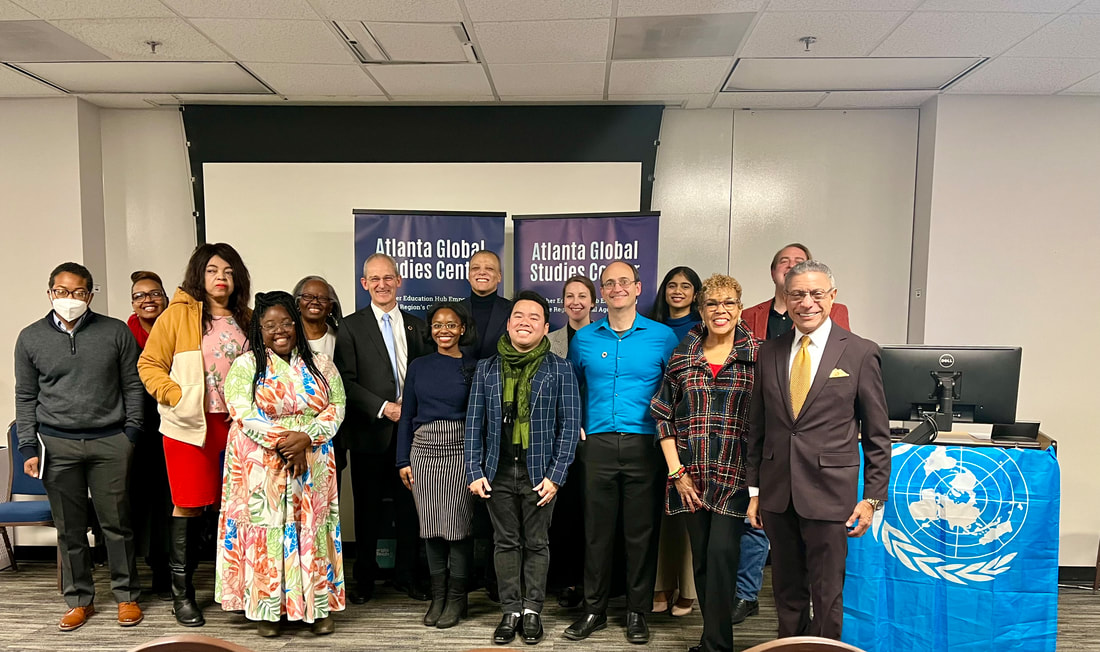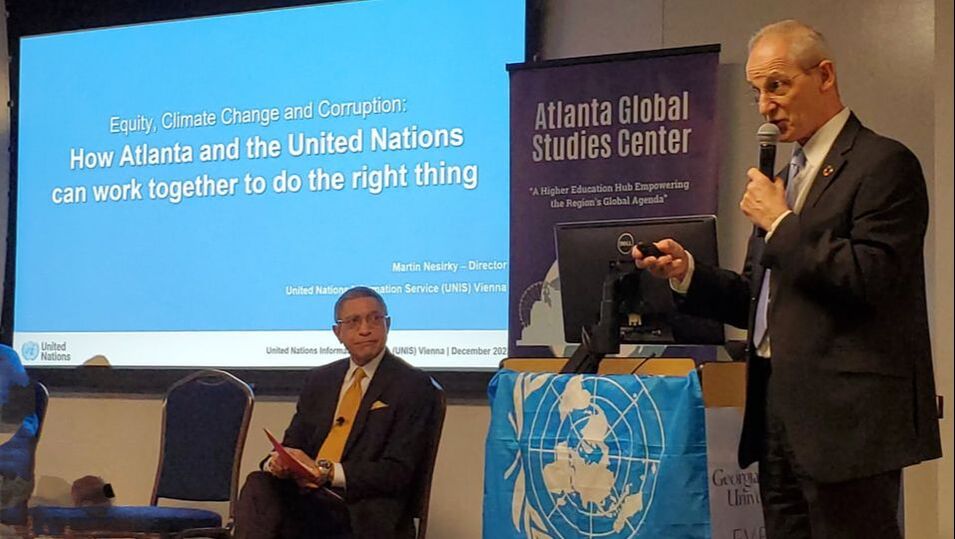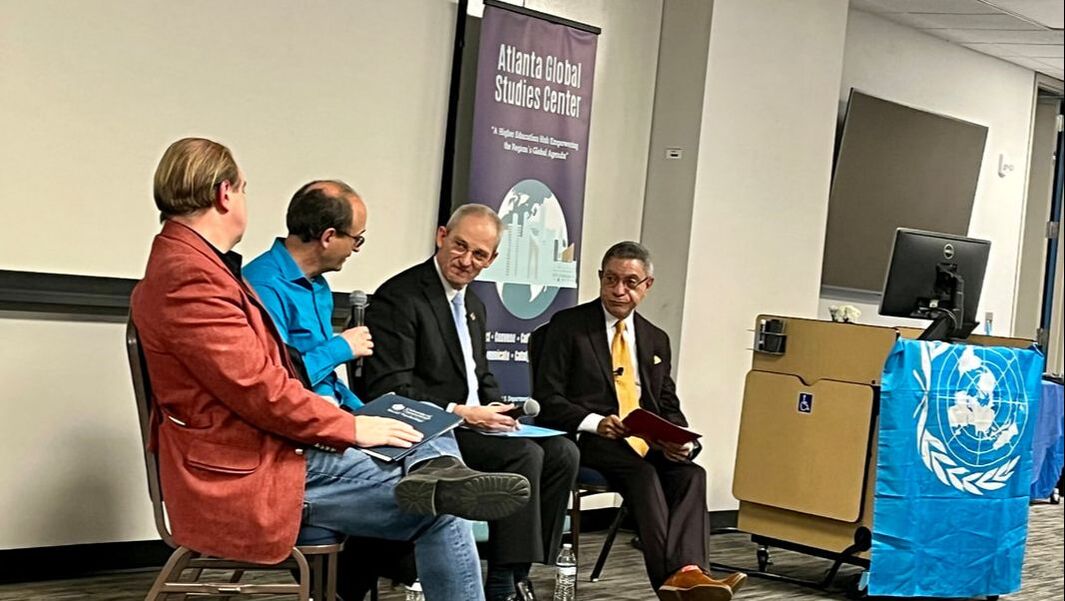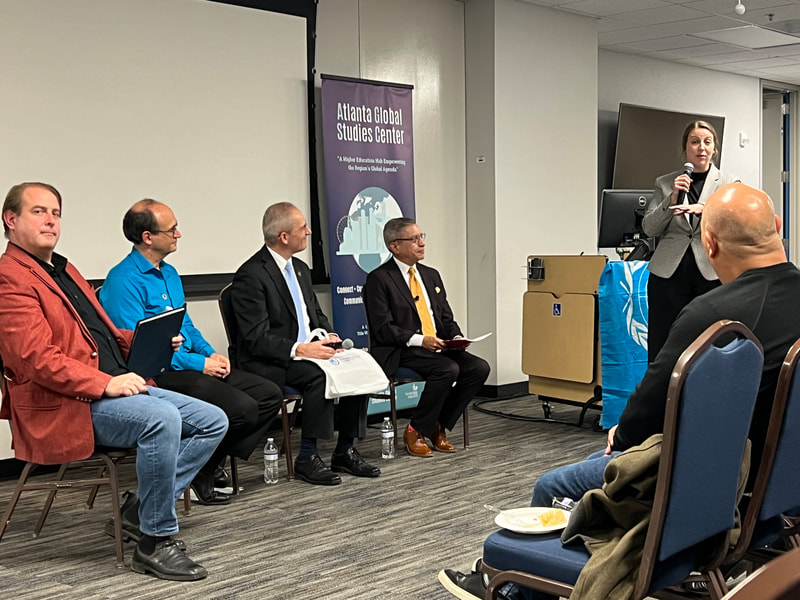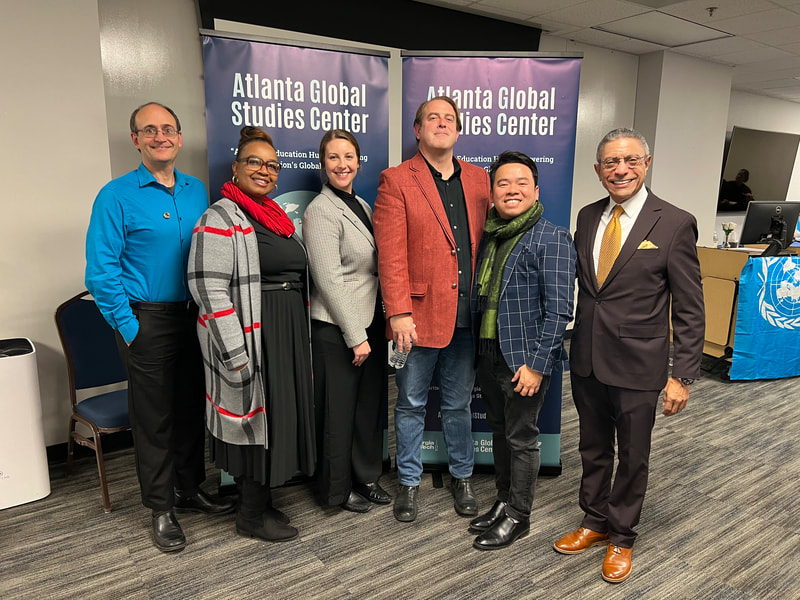by Tracy Gray, Vice President of Advocacy
Description: Mr. Martin Nesirky, United Nations Information Service Director based in Vienna, while in Atlanta to attend the United Nations Office on Drugs and Crime's international anti-corruption conference at the Georgia World Conference Center, was a guest speaker at a side event hosted by UNA-Atlanta, along with Atlanta Global Studies Center at Georgia State University on December 13, 2023 from 6:00 pm to 7:00 pm. Other distinguished speakers included Michael Black, GSU Professor and Principal Senior Lecturer, Neuroscience and Sustainability, and Anthony F. Lemieux, GSU Professor of Communication at the Atlanta Global Studies Center (AGSC). Mr. Nesirky explained the role of the United Nations in improving lives across the globe; he also made a case for why Atlanta and the United Nations are natural partners in the fight against climate change, inequality, and other pressing challenges.
UN Initiatives on Climate Change:
Martin Nesirky opened his comments with the report that the United Nations has spearheaded several global initiatives to combat climate change. The Paris Agreement, for instance, is a landmark accord that aims to limit global warming, and a recent climate conference concluded yesterday in Dubai, United Arab Emirates.
Some have been skeptical, given that the UAE has the third most extensive net-zero-busting plans for global oil and gas expansion.
Nearly every country has agreed to “transition away from fossil fuels” – the main driver of climate change – at the COP28 climate summit in Dubai. It is the first time such an agreement has been reached in 28 years of international climate negotiations.
This year’s COP is a significant milestone: the first assessment of how countries are faring against emissions-cutting commitments made in Paris in 2015.
The UN Framework Convention on Climate Change (UNFCCC) works to implement this agreement, encouraging nations to set and achieve emission reduction targets. In collaboration with Atlanta, the UN can extend these efforts by supporting the city in developing sustainable infrastructure, promoting renewable energy sources, and implementing eco-friendly urban planning.
Some have been skeptical, given that the UAE has the third most extensive net-zero-busting plans for global oil and gas expansion.
Nearly every country has agreed to “transition away from fossil fuels” – the main driver of climate change – at the COP28 climate summit in Dubai. It is the first time such an agreement has been reached in 28 years of international climate negotiations.
This year’s COP is a significant milestone: the first assessment of how countries are faring against emissions-cutting commitments made in Paris in 2015.
The UN Framework Convention on Climate Change (UNFCCC) works to implement this agreement, encouraging nations to set and achieve emission reduction targets. In collaboration with Atlanta, the UN can extend these efforts by supporting the city in developing sustainable infrastructure, promoting renewable energy sources, and implementing eco-friendly urban planning.
Tailoring Strategies for Equity in Atlanta:
Atlanta's unique challenges require customized strategies. The UN can tailor its approaches by closely engaging with local communities, understanding their needs, and incorporating their voices into decision-making processes. Focusing on education, healthcare, and employment opportunities can help bridge social inequalities. The UN can also assist Atlanta in creating inclusive policies that prioritize marginalized populations.
Combating Corruption Conference in Atlanta:
The United Nations, leveraging its global expertise, can aid Atlanta in combating corruption by providing technical assistance, training, and resources. Implementing transparent governance practices, establishing robust accountability mechanisms, and promoting whistleblower protection can strengthen institutions. Collaborative efforts between the UN and local anti-corruption agencies can foster a culture of integrity within the city's governance structures.
Combating Corruption Conference in Atlanta:
The United Nations, leveraging its global expertise, can aid Atlanta in combating corruption by providing technical assistance, training, and resources. Implementing transparent governance practices, establishing robust accountability mechanisms, and promoting whistleblower protection can strengthen institutions. Collaborative efforts between the UN and local anti-corruption agencies can foster a culture of integrity within the city's governance structures.
Examples of Successful UN-Atlanta Partnerships:
Successful partnerships between the UN and cities facing challenges like Atlanta's can be found worldwide. For instance, in Bogotá, Colombia, the UN has collaborated on sustainable urban development initiatives. Sharing best practices, knowledge, and resources has been instrumental in addressing climate change, social disparities, and corruption. These models can inspire and guide collaboration between the UN and Atlanta.
Role of Academic Institutions in Global Issues:
Academic institutions like Georgia State University can actively contribute by conducting research, providing expertise, and fostering innovation. Collaborations with the UN can involve joint research projects, policy development, and educational programs. These partnerships can enhance the UN's understanding of local dynamics and help devise context-specific solutions to global challenges.
Successful partnerships between the UN and cities facing challenges like Atlanta's can be found worldwide. For instance, in Bogotá, Colombia, the UN has collaborated on sustainable urban development initiatives. Sharing best practices, knowledge, and resources has been instrumental in addressing climate change, social disparities, and corruption. These models can inspire and guide collaboration between the UN and Atlanta.
Role of Academic Institutions in Global Issues:
Academic institutions like Georgia State University can actively contribute by conducting research, providing expertise, and fostering innovation. Collaborations with the UN can involve joint research projects, policy development, and educational programs. These partnerships can enhance the UN's understanding of local dynamics and help devise context-specific solutions to global challenges.
Encouraging Cross-Sectoral Collaboration in Atlanta:
The UN can encourage cross-sectoral collaboration by facilitating dialogue platforms, workshops, and conferences that bring together government officials, business leaders, and civil society representatives. Establishing a framework for collaboration on sustainability and equity goals, with clear roles and responsibilities for each sector, can promote practical cooperation in addressing interconnected challenges.
Engaging the Private Sector in Atlanta:
Effectively engaging the private sector in UN initiatives requires demonstrating the business case for sustainability. The UN can work with local businesses in Atlanta to showcase the economic benefits of environmentally friendly practices. Recognition programs, incentives, and public-private partnerships can motivate companies to adopt sustainable business models that align with UN climate change and social equity goals.
The UN can encourage cross-sectoral collaboration by facilitating dialogue platforms, workshops, and conferences that bring together government officials, business leaders, and civil society representatives. Establishing a framework for collaboration on sustainability and equity goals, with clear roles and responsibilities for each sector, can promote practical cooperation in addressing interconnected challenges.
Engaging the Private Sector in Atlanta:
Effectively engaging the private sector in UN initiatives requires demonstrating the business case for sustainability. The UN can work with local businesses in Atlanta to showcase the economic benefits of environmentally friendly practices. Recognition programs, incentives, and public-private partnerships can motivate companies to adopt sustainable business models that align with UN climate change and social equity goals.
Adapting Global Standards Locally:
The UN's global standards can be adapted locally by working closely with Atlanta's policymakers to integrate these standards into local regulations and policies. Tailoring international guidelines to suit the city's context ensures consistency and effectiveness. Regular monitoring and feedback mechanisms can refine these adaptations, ensuring ongoing relevance and impact.
Ensuring Inclusivity in Atlanta:
The UN must engage in extensive community outreach and involvement to ensure inclusivity in Atlanta. Localized awareness campaigns, community forums, and partnerships with grassroots organizations can help identify and address the diverse needs of different communities. Tailoring initiatives to respect cultural diversity and socioeconomic disparities is crucial to avoid exacerbating existing inequalities.
Collaboration with Educational Institutions:
Educational institutions like Atlanta's Global Studies Center can enhance global competency in addressing complex challenges. The UN can provide resources, speakers, and collaborative opportunities for students and faculty. Joint programs, internships, and research initiatives can foster a global awareness and responsibility culture, preparing the next generation to contribute effectively to climate change, equity, and corruption issues.
The UN's global standards can be adapted locally by working closely with Atlanta's policymakers to integrate these standards into local regulations and policies. Tailoring international guidelines to suit the city's context ensures consistency and effectiveness. Regular monitoring and feedback mechanisms can refine these adaptations, ensuring ongoing relevance and impact.
Ensuring Inclusivity in Atlanta:
The UN must engage in extensive community outreach and involvement to ensure inclusivity in Atlanta. Localized awareness campaigns, community forums, and partnerships with grassroots organizations can help identify and address the diverse needs of different communities. Tailoring initiatives to respect cultural diversity and socioeconomic disparities is crucial to avoid exacerbating existing inequalities.
Collaboration with Educational Institutions:
Educational institutions like Atlanta's Global Studies Center can enhance global competency in addressing complex challenges. The UN can provide resources, speakers, and collaborative opportunities for students and faculty. Joint programs, internships, and research initiatives can foster a global awareness and responsibility culture, preparing the next generation to contribute effectively to climate change, equity, and corruption issues.
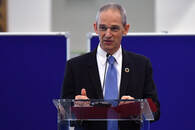
About Mr. Nesirky
Mr. Martin Nesirky is the United Nations Information Service Director in Vienna. Mr. Nesirky served as Spokesperson for the Secretary-General of the United Nations in New York from December 2009 to March 2014. Before that, he was Spokesperson and Head of Press and Public Information at the Organization for Security and Co-operation in Europe (OSCE), Vienna, for over three years. He had an extensive journalistic career at Thomson Reuters (1982 to 2006), serving as Bureau Chief of News and Television in Moscow and Seoul; prior postings also included assignments in London, East Berlin, and The Hague. A UK national and graduate of Bath University (European Studies - German and Russian), Mr. Nesirky has two sons and two daughters.
Mr. Martin Nesirky is the United Nations Information Service Director in Vienna. Mr. Nesirky served as Spokesperson for the Secretary-General of the United Nations in New York from December 2009 to March 2014. Before that, he was Spokesperson and Head of Press and Public Information at the Organization for Security and Co-operation in Europe (OSCE), Vienna, for over three years. He had an extensive journalistic career at Thomson Reuters (1982 to 2006), serving as Bureau Chief of News and Television in Moscow and Seoul; prior postings also included assignments in London, East Berlin, and The Hague. A UK national and graduate of Bath University (European Studies - German and Russian), Mr. Nesirky has two sons and two daughters.
